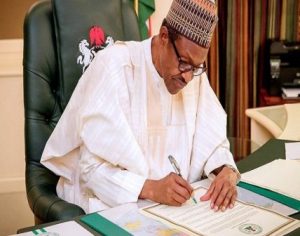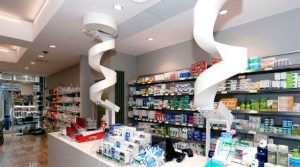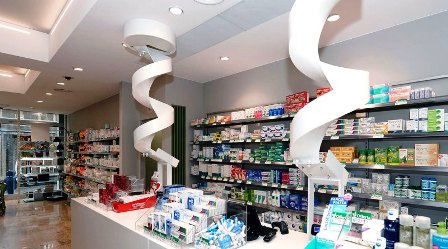-
To protest President Buhari’s delay in signing new Pharmacy bill


ACPN National Chairman
The Association of Community Pharmacists of Nigeria (ACPN) has ordered the closure of all pharmacy shops in the country on Tuesday from 12 noon to 2 pm to protest the delay in signing the Pharmacy Council of Nigeria bill 2017 into law.
The Bill has been passed by the two arms of the National Assembly but President Muhammadu Buhari is yet to give his assent , even as the current National Assembly winds up this month.
Fearing that the bill which seek to sanitise the nation’s community pharmacy practice, especially the chaotic drug distribution system and the proliferation of fake and substandard drugs all over the country, may not see the light of day, the ACPN urged its members to shut their pharmacy “to tell Nigerians that you are not there with them only to make money, but also as a professional that is concerned about the rising perversion of drug abuse that is ravaging our dear nation.”
The association also wrote a letter to the president urging him to, as a matter of urgency, sign the bill and help restore normalcy to the country’s pharmacy practice.
The 3-page letter signed by the National Chairman of the association, Pharm. Samuel Adekola MAW and National Secretary Pharm. (Mrs.) Abosede Idowu told the president that his delay in signing the bill has complicated the perennial woes of fake as well as falsified drugs in the country.
The association further briefed the president on what Nigeria stands to gain by having a new Pharmacy law to replace the current obsolete one derived from the first Pharmacy Ordinance of 1887
“The Pharmacy Council of Nigeria (PCN) Bill 2017 is very consistent with similar laws in the Commonwealth League of Nations, where regulatory laws and statutes have become very sacred in keeping pace with the norms and ethos of public health. Examples of such pharmacy regulatory laws in some Commonwealth nations include; General Pharmaceutical Council of Great Britain, Pharmacy Council of Ghana, Tanzania, Kenya, South Africa. Others are National Association of Boards of Pharmacy in United States of America (a wholly Government owned pharmacy regulatory body) and Pharmacy Council of Canada among others.
“It is a statement of fact that many less endowed African nations have today polished their pharmacy laws to meet global best practices such that the terminal consequences of poor statutes, weak enforcement, and so on which engender easy access to drugs to promote the vicious cycle of drug abuse and misuse, falsified drug syndrome etc. are gradually being eliminated in these climes. This is the same purpose the new Pharmacy Council Bill is intended to achieve.
“One of the philosophies of the National Drug Policy 2005 is to guarantee that Nigerians have access to safe, efficacious and affordable medicines. This is a cardinal responsibility of every Government to its citizenry. One of the major benefit packages of PCN bill is that it opens a unique window of competence driven service rendition at all levels. The new Satellite Pharmacy concept gives us the prospects of additional pharmaceutical premises in hundreds of thousand range manned by registered pharmacist.
“The Bill provides that any pharmacist who has over ten (10) year post-qualification experience can own a satellite pharmacy not withstanding his primary practice option. What this does is that professional service points in pharmacy will increase from about five thousand (5000) we currently have to over one hundred thousand (100,000) in Nigeria. These satellite Pharmacies in turn have mandate to provide oversight in a manner of hub and spoke model over the Patent and Proprietary Medicines Vendors thereby improving their regulation. The enforcement of sales of medicines in only registered pharmacies and patent medicines stores by the PCN is the only way to permanently redress the menace of drug abuse and falsified drug syndrome in Nigeria. This has been prescribed by the Poison and Pharmacy Act.

“The PCN Bill 2017 clearly prohibits sale of drugs in unauthorized places such as open drug markets, this in essence is in tandem with the National Drug Distribution Guidelines (NDDG) which is the official Government tool structured to impose decorum in the unwieldy drug distribution channels which Nigeria currently contends with.
“Today as it stands Government moves to replace the unlawful open market structures with Coordinated Wholesale Centers (CWC) need to be grounded in lawful templates which the PCN bill guarantees. The responsibilities of the critical stakeholders and in particular our regulators like PCN, NAFDAC, NDLEA as well as police will automatically be enhanced once all the necessary reforms are formalized.
“Flowing directly from above, the PCN bill particularly compels PHARMACISTS to show more responsibility in their professional practice. The need for discipline is showcased at greater heights because the Disciplinary Tribunal is geared to wield the big stick on erring pharmacists and pharmaceutical premises in the best interest of consumers of health.”
The association therefore urged President Buhari t to “heed this clarion call” to engender a new agenda of productivity, professionalism, self-sufficiency in local production and regulatory excellence in the pharma-sector.
“These achievements will change the narratives and place the pharma-sector in good stead to contribute to National Gross Domestic Products (GDP),” it said.
Nigeria remains the only country in Africa where drugs, no matter how potent, can be obtained in the open market and sold by anyone, whether trained or not and without a prescription.
The country is also reputed for having a highly disorganized drug distribution network, giving rise to the proliferation of fake and adulterated drugs in its pharmaceutical market.

